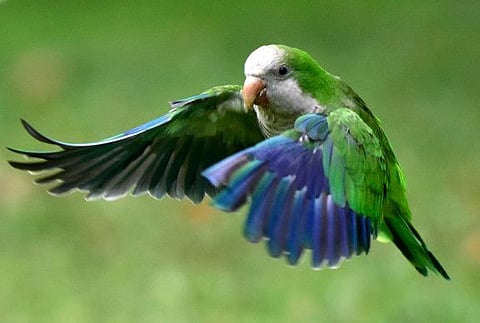Off the cuff: How easy is the fall from grace
Parakeet’s living nightmare is playing a game of patience with a grey-and-ginger cat

The early bird, they say, gets the worm. Or, put another way, the early worm meets the bird.
There’s no escape for the poor, industrious, soil-turning earthworm once it is spotted from the treetop by a sharp-sighted bird. Gone, in one fell swoop! It is also, I believe, the one and only time that a worm will — however briefly — experience the headiness of being airborne before everything comes to an end.
But here’s an account — a true account — of a sand tray, crawling with worms … and every one of them ends up lucky. Lucky, despite being in the direct line of sight of not one but a whole flock of birds: parakeets. Rainbow-coloured and raucous. It is the dead of winter but that, apparently, is when the eucalyptus trees here decide to bloom. Pink blossoms stand out against the pale green leafage, waving in the gentle breeze.
The air outside may be icy; cold enough, one would think, to suggest migration to any sane bird. But the parakeet apparently entertains no such notion. If it’s going anywhere, it is from its nest straight to the nearest eucalyptus tree. The flock just off my balcony are daily visitors. Their appetite is insatiable. They will sip nectar from the eucalyptus blossoms from the crack of dawn until it’s time to go home. That is the extent of their industry.
The nectar, I’m convinced, is so addictive that the birds cannot abandon their drinking habits. They will drink, fly away briefly on a cloud of euphoria and return before 20 seconds have elapsed. Then they will engage in another round. And another.
Amusing antics
By mid-afternoon, the drinking starts taking its toll. The copious amount of nectar consumed begins to go to the head. Anyone observing these amusing antics would assume that now’s the time to call a halt to this hyper-liquefying and try, instead, to find something solid to consume: like a few worms. In fact, there’s a tray full of them on the balcony, in plain sight. But either the parakeets have no appetite for worms after a belly full of nectar, or they simply cannot see the worms any longer — their noted sharp sight has been dulled, or even distorted.
Also Read: Life’s about blooming where you’re planted
Also Read: How to get away from adolescence
With the nectar making their heads swing it’s anybody’s guess what the worms look like to a parakeet in this state. What’s clear is that the birds are not in the least interested in the worms. And the worms, if they only knew it, would be astounded at their luck. Only, they haven’t a clue. And the parakeets, some of them totally inebriated by now, also haven’t a clue as to how things might pan out for them after this session of wild partying on the eucalyptus tree.
In the past, I have watched a few of them consume so much that they’ve lost control of their faculties entirely. I’ve observed them clutching desperately to a branch while their little feathered rainbow-hued bodies battle the loss of stability and equilibrium. On a few occasions, a timely (or inopportune) gust of wind has caused what little gripping-facility remained in the claws to come undone, causing the bird to slip off the branch and fall, without even trying to flap and fly, to the ground.
My apartment is situated on the third floor, but if I leaned over the balcony and looked down I would see — not a fallen bird — but the parakeet’s living nightmare, seated under the tree, waiting, playing out this game of patience: a grey-and-ginger cat, of course. I have spotted it once, slinking away from public view, mouth full of rainbow feathers. And I’m reminded, there’s a lesson to be learned about the dangers of excess: how easy it is to fall from grace.
— Kevin Martin is a journalist based in Sydney, Australia.


